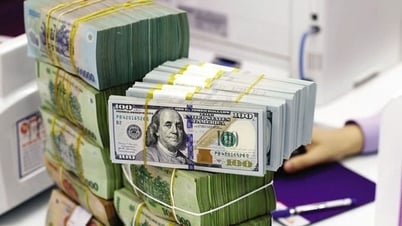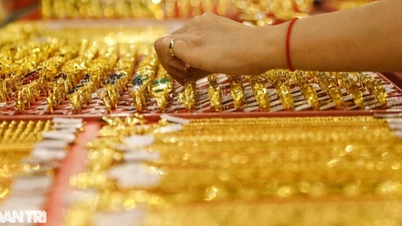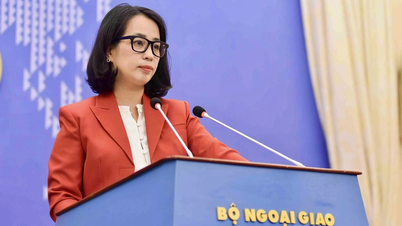Analysts say that bad news that is unfavorable to stocks has passed or is decreasing, and the market has prospects for recovery.
In a recent analysis report by VinaCapital, the group of experts said that from mid-September to late October, Vietnamese stocks recorded a 16% decline and were sold off due to a combination of domestic and foreign factors. The above factors include concerns about rising interest rates when the USD exchange rate is high, fluctuations in Vingroup and Vinhomes shares related to convertible bonds, liquidation orders from many securities companies, rumors about the control of some unofficial margin lending sources, and corporate profits in the third quarter below expectations.
The biggest factor weighing on the market is the devaluation of the dong, which has raised concerns that the State Bank will tighten monetary policy to counter the devaluation, while also prompting foreign investors to sell, according to VinaCapital.
However, the actual developments are not as investors expected. The USD exchange rate has been stable for many weeks without the State Bank having to raise interest rates. At the same time, the USD's upward momentum seems to have ended, especially after the low ISM/PMI indexes last week, making VinaCapital believe that this agency will keep interest rates unchanged in the coming months.
The analysts expect the USD/VND exchange rate to depreciate by 3% by the end of this year, supported by the growth of Vietnam's trade surplus, from 3% of GDP in 2023 to 7% in 2024. This expectation is further reinforced by the VND's appreciation of about 1% in the past few days, bringing the depreciation compared to the beginning of the year back to 3%.
"All the most negative factors have now been or are easing and the recovery prospects of Vietnamese stocks in the coming months are supported by profit growth and economic recovery, combined with cheap market valuations," VinaCapital's report said.
Regarding monetary policy, VNDirect shares the view that the State Bank is unlikely to raise interest rates. Yes, deposit interest rates are at their lowest level compared to the period from 2021 to the first half of 2022 due to excess system liquidity amid weak credit demand. The unit expects the 12-month deposit interest rate to remain at an average of 5.4% per year for the remainder of 2023. Accordingly, lending interest rates will continue to decline until the end of this year thanks to the rapid decline in capital mobilization costs of commercial banks recently.
In addition, the State Bank has also stopped issuing treasury bills after more than a month of implementing this business. As of November 9, VNDirect reported that nearly VND185,700 billion had returned to the system through the amount of mature treasury bills.
The market has shown signs of improvement. At the end of this week, the VN-Index accumulated nearly 25 points compared to the end of last week, with liquidity increasing above average. The HoSE representative index had its second consecutive week of recovery, currently above the support level of 1,100 points. According to Saigon - Hanoi Securities (SHS), this development helps eliminate the possibility of the market returning to a downtrend.
However, VN-Index is still in the first recovery phase and is moving loosely. This index will need more time to find a balance zone for the accumulation process. SHS expects the accumulation base to form above 1,100 points when the weekend session tends to retest this support level. The analysis team predicts that the testing process will likely be successful.
SHS noted that although economic activities may be vibrant in the last quarter of the year and GDP is showing signs of recovery, macroeconomic factors are still risky. The world's geopolitical situation is unstable, global economic growth is low, on the other hand, global inflation is still not really under control due to the continuing upward trend in energy and food prices, and the EU economy is likely to enter recession.
Mirae Asset Securities also believes that there are three biggest risks coming from the world situation. First, global interest rates will remain high for a long time and affect debt restructuring, business operations, and purchasing power. Second, the potential impact from the real estate crisis in China. Third, the scenario of a stronger-than-expected USD and net selling pressure from foreign investors. In fact, foreign investors still maintain their net selling strategy with VND2,720 billion in October. Since the beginning of the year, foreign investors have sold about VND10,500 billion in the context of the USD's appreciation and high US bond yields.
Siddhartha
Source link




![[Photo] National Assembly Chairman Tran Thanh Man meets with Thai Prime Minister Paetongtarn Shinawatra](https://vphoto.vietnam.vn/thumb/1200x675/vietnam/resource/IMAGE/2025/5/15/e71160b1572a457395f2816d84a18b45)

![[Photo] Prime Ministers of Vietnam and Thailand visit the Exhibition of traditional handicraft products](https://vphoto.vietnam.vn/thumb/1200x675/vietnam/resource/IMAGE/2025/5/15/6cfcd1c23b3e4a238b7fcf93c91a65dd)






























































































Comment (0)